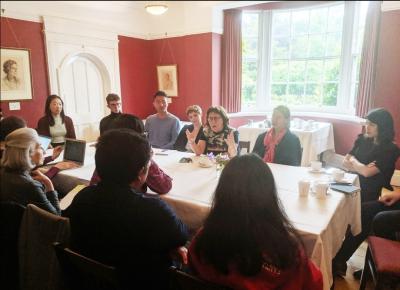China’s legal system has experienced profound changes over the past 40 years. During the Cultural Revolution, the legal system was rendered dysfunctional under the political slogan of ‘Completely smash the public security organs, prosecutorial organs and courts’. Since the country embraced opening up and reform in the late 1970s, the deepening of market reform, the intensification of trade and commercial exchanges with the world, and the preservation of the party-state polity have resulted in a highly complex landscape of legal reforms.
Oxford Law Faculty's Chinese Law Discussion Group and the European China Law Studies Association recently organised a roundtable in Oxford, which brought together 30 scholars and practitioners from diverse disciplines. The participants reflected on major developments in their various areas of research and explored the questions of ‘What is the role of law in President Xi Jinping’s China?’ and ‘What will China’s legal system look like in the next 10 years or so?’ The overarching objective of the roundtable was to scope out new and forward-looking research agendas in Chinese law and related areas.

Professor Susan Finder, Distinguished Scholar in Residence at the School of Transnational Law of Peking University, was the keynote speaker of this event. She started to write on Chinese law back in the 1980s when she worked as a foreign lawyer in Hong Kong. In 1992, she first had the opportunity to interact with judges on the Supreme People’ s Court of China (SPC) and published the first comprehensive study of the operations of the SPC in English. Having observed China’s legal system for over 25 years, Prof. Finder regularly reports on the most up-to-date developments in Chinese law in her influential blog, the Supreme People’s Court’s Monitor.
Prof. Finder noted several developments in China’s judicial system based on her observations over the past three decades. One is the proliferation of commercial cases before the courts, as the country deepens economic reform. Whilst the SPC in the 1990s heard relatively few commercial cases (especially compared to criminal law cases), there has been a surge of commercial cases heard by the country’s highest court over the past decade. This trend is likely to continue. Prof. Finder has recently been appointed a member of the international commercial expert committee of the China International Commercial Court (CICC) of the SPC.
Apart from the diversification of the types of cases, improvements in the quality of judges have also been significant. In the 1990s, many judges at all levels of Chinese courts were former military personnel who did not receive formal legal training. This has fundamentally changed with the rise of legal education in China. A growing number of SPC judges now have Master’s degrees in law and some with PhDs. There has also been a growing number of women at all levels of the judiciary.
There has been increased publicity of judicial decisions, which promotes transparency of the legal system and benefits the legal profession more broadly. Back in the 1980s, ploughing through paper copies of case dossiers were almost inevitable for any researcher in Chinese law. Now the digitalised judgements database ‘China Judgements Online’, established by the SPC in 2014, provides public online access to cases and information on the Chinese courts nationwide. This database has greatly facilitated academic research, although certain (sensitive) information is still not publicised.
China’s judicial system has experienced many positive developments overall since the country’s opening-up. As Prof. Finder noted, the year 2008 was possibly a turning point in judicial reform. From 1998 to 2008, XIAO Yang as president of the SPC pushed several reforms such as mandating that the SPC (and not higher people’s courts) review capital crime cases, the professionalisation of judges, public open trials and independent adjudication. From 2008 onwards, Xiao’s successor WANG Shengjun started to emphasise the slogan of ‘Three Supremes’, which revived the enhancement of the Party’s leadership and left little room for any bold reforms. The current SPC president, ZHOU Qiang, has seen the Party’s leadership elevated to an even more central place in the judicial system in the era of President XI Jinping. Judicial reforms are inevitably affected by the changing political environment.
Which areas are Chinese courts likely to see considerable changes in the next five to ten years? Based on the SPC’s Fifth Judicial Reform Plan, Prof. Finder highlighted two areas based on her observations. The first is to incorporate socialist core values through legal interpretation in adjudication. Family law is a typical example. Family structures and relations in China have altered significantly with changing social-economic circumstances. How will Chinese courts deal with the real-life cases in family law and fit relevant legal rules around ‘socialist core values’? Second, the SPC may give greater attention to the recognition and enforcement of foreign judgements. Whilst the current draft Convention on the Recognition and Enforcement of Foreign Judgments is likely to be the version China will sign and rectify, there has been tension between China and other negotiating parties regarding judicial sovereignty and national security concerns.
Prof. Finder’s observations stimulated a lively debate among roundtable participants. Complex political and economic circumstances, changing normative conceptions and institutional arrangements have shaped and will continue to shape the direction of travel for China’s judicial system and its legal system more generally. What is the role of the law in a country that is culturally identified with Confucian traditions, economically characterised as a transitional ‘socialist market economy’, politically featured as a party-state regime and institutionally depicted as a multi-levelled system of governance and administration? How will Chinese courts deal with the various policy goals pursued by the party-state, ranging from maintaining GDP growth while deepening economic restructuring, improving dispute resolution and ensuring social stability, to competing for a greater say in international forums?
How China’s legal system will change in the next 40 years will capture the attention of many within and beyond the scholarly community worldwide. The organisers of this roundtable, Dr Mimi Zou (Oxford) and Prof. Vivienne Bath (Sydney), believe that the exchange of different perspectives and knowledge from diverse disciplines is critical for any debate on China’s legal system.
Share:

